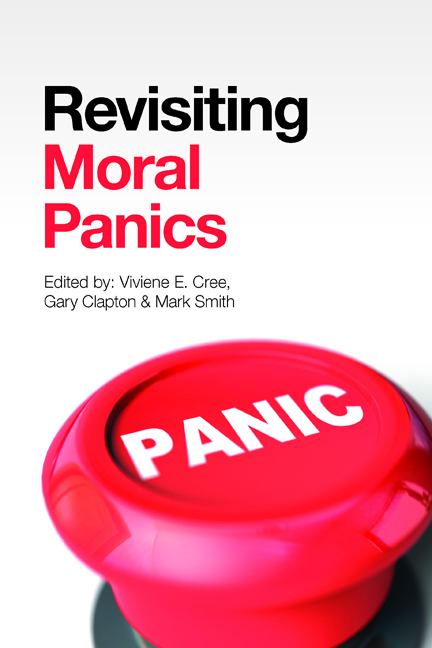Book contents
- Frontmatter
- Contents
- Contributors
- Preface
- Commentary moral panics yesterday, today and tomorrow
- Part One Gender and the family
- Part Two Moral panics in our time? Childhood and youth
- Part Three The state, government and citizens
- Part Four Moral crusades, moral regulation and morality
- Afterword the moral in moral panics
- Conclusion Moral panics and beyond
- Index
Introduction - Introduction
Published online by Cambridge University Press: 08 March 2022
- Frontmatter
- Contents
- Contributors
- Preface
- Commentary moral panics yesterday, today and tomorrow
- Part One Gender and the family
- Part Two Moral panics in our time? Childhood and youth
- Part Three The state, government and citizens
- Part Four Moral crusades, moral regulation and morality
- Afterword the moral in moral panics
- Conclusion Moral panics and beyond
- Index
Summary
To open each part of the book, we introduce the work of a key theorist within the ‘moral panic’ genre. The work of Stanley Cohen has played a central part in the creation of ideas around moral panic and these, as will be shown, have developed over time. Many of Cohen's ideas are reflected in the chapters in this and other parts of the book, while others have been taken forward in other writing in the field.
Stanley Cohen
Stanley Cohen (Stan) was born on 23 February 1942 in Johannesburg, South Africa and studied Sociology and Social Work at the University of Witwatersrand. He moved to the UK in 1963 with his wife, Ruth, where he worked as a psychiatric social worker and PhD student at the London School of Economics (LSE), studying social reactions to vandalism. Cohen was appointed to his first academic position in 1967, at the University of Durham, and in 1968, with Jock Young and others, he set up the first National Deviancy Conference, an initiative that was to challenge conventional ideas about crime and criminology for years to come. He moved to Essex University in 1972, where he became a professor in 1974. Stan and Ruth relocated to Israel in 1980; Stan was professor at the Hebrew University of Jerusalem until 1994. He returned to the LSE in 1995, where, as Chair in Sociology, he helped to establish the Centre for the Study of Human Rights.
Stan Cohen is widely held to be one of the world's pre-eminent sociologists; that he began his career as a social worker makes absolute sense, given his lifelong concern for theory developed from practice, for making connections between the personal and the political, and his deep concern for human rights. Cohen's first book, Folk Devils and Moral Panics (1972) was the book of his PhD study on the 1960s battles between mods and rockers. Here Cohen argued that the social reaction to the minor skirmishes between young people on the beaches in Clacton accelerated their bad behaviour and led to a widespread moral panic centred on young people. This book marked the beginning of the translation of the idea of moral panics from academic to everyday usage and, unsurprisingly, to a great deal of misuse of the concept too, as Cohen was acutely aware.
- Type
- Chapter
- Information
- Revisiting Moral Panics , pp. 3 - 8Publisher: Bristol University PressPrint publication year: 2015

